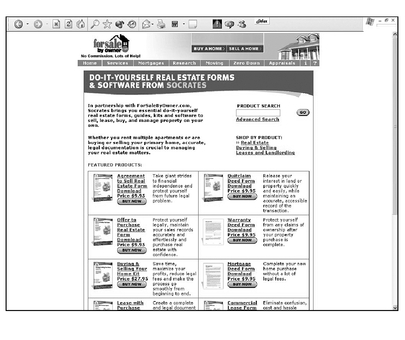Chapter 10
Fielding Offers
In This Chapter
• Here comes the offer!
• Breaking down the basics of an offer
• Know every last detail
• Contingencies, remedies, and other factors
We’re starting to get down to crunch time. You’ve done all the necessary steps, from advertising to hosting an open house to doing an absolute stellar job of putting your house in the best light when buyers come to call.
Now, someone is about to put in an offer to buy it. And as Sally Field once declared after having won an Academy Award: “You like me! You really like me!”
Because someone is poised to make an offer to buy your home, you need to know what that offer is going to contain and be ready to respond.
That’s exactly what we cover in this chapter. We address the nuts and bolts of what a properly presented offer should include and how each offer can impact your ultimate goal—selling your home.
The Mechanics of an Offer—What to Expect
The moment has finally arrived. A prospective buyer has notified you that he intends to forward an offer to you.
Fantastic! Uhhh … now what happens?
The first rule of thumb is to keep doing what you’ve been doing, at least for the time being. Just because someone says they plan to place an offer on your home doesn’t necessarily mean they’ll follow through. A lot can happen—they may change their minds or, by chance, come across another home that they prefer. You need to have a written offer in hand to know for certain whether their intent is genuine.

Sales Snafu
From a legal standpoint, an oral offer isn’t worth much. If, for instance, you agree orally on a price, who’s to say otherwise if the buyer submits a written offer that’s a good deal less? Never accept anything but written offers. If a buyer asks if you’ll accept a certain offer, say you’ll be glad to consider it—when it’s on paper.
The Essentials of an Offer
Initial offers can be as varied as the people who make them. Some you see may be rather thorough in their scope while others are quite a bit more basic. A buyer can use a preformatted document or simply type up something on their own (be sure to have your attorney review both). But a valid offer is always comprised of a completed real estate agreement known as an Offer to Purchase. Depending on the format used, the offer will specify a purchase price, the necessity of a home inspection, and, as we discuss later, a satisfactory Purchase and Sale Agreement. A valid offer also always includes an earnest money check.

Tools of the Trade
The earnest money deposit, in effect, means what it says. By including a check with an offer, a buyer is indicating that she is in earnest in her desire to buy your home. More on this in the next section. A Purchase and Sale Agreement is drawn up to cover every single term and condition that applies to the sale of a home. Depending on where you live, the document may go by a slightly different name.
Offers can be delivered by the buyers themselves or, if they’re working with one, their real estate agent. Now keep in mind that any offer you receive to buy your home will never be open ended in terms of how long you have to respond. The time can range from anywhere between “upon presentation” (meaning you have to yay or nay on the spot) to the more common timeframe of 48 hours. But two can play the time game as well—if you counter a buyer’s offer, you also specify just how long you’re going to give him to decide what he wants to do next.
Here’s a way to save yourself some real headaches. If a buyer lets you know she’s going to present an offer, ask her to attach a letter to her Offer to Purchase from a lender saying she’s been approved for at least the sales price of your home. That can save you the headache of waiting for a buyer to prequalify for a loan if their offer is worth considering.
The Purchase and Sale Agreement
As we mentioned earlier, initial Offers to Purchase will vary in their content and, to a certain degree, format. But, no matter their makeup, signing them commits you to a legally binding contract. And that moves you into a second, more comprehensive sales agreement, which must be drawn up and agreed to by both parties. This contract goes by various names depending on where you live. For our purposes, we’ll use “The Purchase and Sale Agreement.”
Where you can obtain suitable Purchase and Sale documentation depends on just how autonomous you want to be in selling your home. There are a number of websites—several of which are cited at the conclusion of this chapter—where you can download Purchase and Sale Agreement forms. Depending on the site, you may also be able to obtain documents that conform to any local real estate laws that may apply.

Selling Smarts
Independence is all well and good, but it’s never a bad idea to have your attorney draw up Purchase and Sale Agreement contracts. Not only can she address any local real estate legal issues, she’ll be in on the ground floor should any hurdles or problems come up later.
As we’ve said before, the Purchase and Sale Agreement you consider is likely going to be vary somewhat between buyers. But, boiled down somewhat, the agreements do share a number of common (and significant) features. It pays to know just what those are and how they may impact your sale.
If you’re wondering why we’re hitting on the makeup of a sales contract before we cover counteroffers, negotiation, and finalizing financial details, the reason is simple: the better you know the ultimate makeup of your sales contract, the better you’ll be positioned to negotiate effectively. First things first! Because agreements vary, bear in mind that our advice for the treatment of a Purchase and Sale Agreement may not apply uniformly to all the agreements you may work with. Be smart and direct any questions or concerns to your attorney.
Here are some common elements of a Purchase and Sale Agreement:
• The purchase price, including other financial details such as earnest money.
• Date when the contract goes into effect. This happens when both the buyer and seller sign the contract.
• Include the full legal names of buyers and sellers and whether they are single or married. Usually, the buyer’s legal address is also included. Note: It doesn’t come up all that often, but it never hurts to make certain that the buyer listed in the Purchase and Sale Agreement is of legal age—usually 18. If they’re not, that may ultimately kill the contract. This can happen when, for instance, a family buys a college student a home to live in while he’s attending school.
• Description of the home. This portion describes the property. It usually includes the address and an approximate square footage of the lot where the home is located. The description will also include a legal description, which is information about the property that is looked up when the sale is recorded at the local registry of deeds.
• Purchase price. First and foremost, this identifies the purchase price upon which both the buyer and seller have agreed. This section also addresses how the buyer will pay at the time of closing. Options include cash, banker’s check, certified check, and other methods of payment. This portion should also address terms of any necessary financing, including down payment, the type of loan the buyer plans to use, and other relevant details.
• Earnest money. The section on purchase price will also include the earnest money deposit and who holds the earnest money deposit. The earnest money deposit is also called the good faith deposit. As we mentioned earlier, this represents a serious intention on the buyer’s part to do his utmost to complete the sale. The general rule of thumb is that the earnest money deposit should be at least $1000 or at least 1 percent of the purchase price. From there, this figure increases the more expensive the home. Bear in mind that this is not a fee but a deposit that eventually goes toward the purchase price. After certain inspections have been completed and all forms of disclosure have been given to the buyer, the earnest money is generally deposited into an escrow account with a real estate attorney or escrow company.
Always try to get a reasonable earnest money deposit—as we suggest above, 1 percent of the purchase price. While you want a fair commitment from the buyer in return for taking your home off the market, you don’t want to demand too large a deposit—they may just walk. One good way to strike a balance is to know the buyer’s credit rating—the better the score, the less risk you can take on with a lower earnest money deposit.

Tools of the Trade
Escrow refers to something of value—in this case, the earnest money deposit—that’s held by a third party. Escrow agreements instruct the holder to distribute the funds after the sale is finalized.
The earnest money section in the Purchase and Sale Agreement may also address what happens to the funds if the deal falls apart. Depending on the circumstances, they may be returned to the buyer, retained by the seller, or divvied up between the two. Deals can fall apart due to an unsatisfactory inspection, failure to obtain a loan, prohibitive liens on a home, or a buyer simply changing his mind. Each will effect just how the earnest money will be divvied up.
Of course, we’re all wonderfully trusting human beings, particularly when it comes to selling real estate. But no buyer is going to let you, the seller, hold the earnest money while the deal goes through. So the contract will specify who keeps the money safe and sound. It will go into an escrow account.

Selling Smarts
As a solid form of protection, have your attorney work language into the contract that directs the escrow agent to hold all escrow funds in the event of some dispute until both the buyer and seller agree that they can be released. That can help stop a buyer from walking away from a deal unnecessarily soon.
A deal that falls apart is one good reason to try to obtain as large an earnest money deposit as you can. If the sale doesn’t pan out, and you’ve lost days and even weeks with your home off the market, it’s often the only compensation you may be able to obtain.
Who holds the earnest money can vary. Often, it’s one of the attorneys involved in the sale. There are also escrow companies who specialize in safeguarding escrow funds.
• Deadlines. Having things happen when they should is as essential an element as any on the Purchase and Sale Agreement. Look for items such as these:
Financing timeframe. This spells out how quickly the buyer has to get any necessary financing in order. Usually, this begins with a preapproval letter with a credit check within five to seven days after the contract is signed (unless, of course, the buyer was already preapproved when they presented the purchase agreement to you). If he’s not, you can always have any lender with whom you may be working do the job for you—refer back to our discussion in Chapter 3 for additional details. After that’s out of the way, a formal loan application follows. Complete loan approval should be obtained within 30 to 45 days from the date you sign the contract offer.
Deadline if a loan is denied. If the loan is denied after the date specified here, the buyers should forfeit their earnest money deposit. This may seem unnecessary, particularly with buyers who are preapproved, but things can go wrong, so it’s a valuable bit of protection.
Inspection and disclosure timeframes. This spells out the timeframe for inspections and any action to correct any identified problems with the house. Inspections and delivery of any disclosures should be completed within five to seven days after the contract is signed. The buyer usually then has two to three days to let you know—in writing, by the way—any problems discovered in the inspection or disclosures. You then have two to three days to determine what you want to do. You can agree to fix the problems at your own expense, propose that you split the cost, or simply refuse to do anything. Like the buyer, you have to respond in writing.
Deadline for appraisal. If the buyer—or, by chance, the loan company—insists on a fresh appraisal, this specifies when that has to be completed.
Termite inspection timeframe. This is generally done any time before the closing takes place. Most lenders require a clear termite inspection within 30 days before you close. That ensures the termite inspection is up to date.
Date and location of settlement. This is also called the closing. You should also agree with the seller on a timeframe for closing the sale. If the details of the loan approval permit it, it’s often a good idea to aim for as quick a closing as you can.
Not only do you get your money faster, but a tight deadline can help keep things moving forward as they should.

Tools of the Trade
The closing is the point at which real estate formally changes ownership. You sign a variety of documents and also settle up on various related charges and fees. We cover the closing in exhaustive detail in Chapter 16. Broom clean condition means more than a quick sweep. State guidelines vary, but most apply the term to mean a rather thorough cleaning—countertops washed, bathrooms cleaned, and all garbage and remnants removed and hauled away. It’s not just complying with contrac-
Date property is vacant and property condition. This spells out when you will be out of the home and the shape the property is in at that time. With regard to property condition, many contracts specify that the home be left in what is known as broom clean condition. The buyer may require a walk-through of the house on the day before or day of settlement to ensure it is in good condition.
It’s always a good bet to get out on or before the day of closing if possible. Of course, that’s not always possible. Some sellers will need to stay in the house after closing. If it’s more than two or three days, you may have to pay the buyer a pro-rated “rent back.” This amount is usually the daily cost to the buyer for their entire mortgage payment, including taxes and insurance.
To protect against any claim of damage or complaint that the property is not suitably clean, keep your homeowner’s insurance in effect until the sale has been completed.
• List of items included in the sale. This is a list of what will stay with the house after the sale, including appliances, lighting fixtures, window treatments, and other features. We address this in some detail in the Chapter 11 on negotiation strategies, but know for now that you can try to bring certain elements of your home with you after you move—even such things as outdoor trees and shrubs, if they have a certain sentimental value.
• Payment of closing costs. This is a biggie. The contract should stipulate who will pay the buyer’s and seller’s closing costs as well as the various transfer and recording fees that localities and states charge when property is transferred.
Who pays these costs is almost always negotiable between buyer and seller, but there are usually common local practices. Check with your attorney to see what’s expected and what may be somewhat unusual.
We will tackle the issue of closing costs and other related expenses and fees in Chapter 12, but it’s important to recognize that these issues will be raised in a sales contract. For instance, depending on the circumstances of the sale, it’s not unusual for a buyer to ask the seller to pay some of their closing costs, such as transfer and document recording expenses. It’s also a good idea to check with your attorney on this because which party pays what can also be influenced by what’s normally done in the area where you live.
• Payment of commission. If you and the buyer have agreed to work with a real estate agent in some manner, the contract should spell out the amount of commission due, to whom it’s due, and who pays it.
• Proration of expenses. This spells out how real estate taxes, rent, fuel, water bills, and utilities should be adjusted (prorated) between buyer and seller. This usually depends on the time of month in which the closing takes place.
• Type of deed. This portion of the contract specifies what sort of deed will apply to the sale. A deed, in essence, is proof of ownership of a particular piece of property. There are two sorts of deeds—a warranty deed and a quitclaim deed. On the surface, this may seem a headache in the making, as some buyers may insist on only a warranty deed. But the truth is local real estate regulations usually specify what sort of deed is used in a particular location.
• Quality of title. Because title means ownership of a property, quality of title refers to just how solid that ownership happens to be. Generally, contracts will include the term “clear record and marketable title” to specify the best title possible. However, the sale can fall apart if certain problems are discovered that may affect the quality of the title. These can include outstanding mortgages, court judgments, tax liens, and other snafus that muddy just who has clear title to the property. Obviously, title problems can prove to be a real deal killer. Do what research you can proactively to identify any problems and, in the case of issues such as tax liens, have them taken care of.
• Offer contingencies. This can prove to be a broad list. We’ve already touched on some of them earlier in this chapter, but any sales contract is likely to contain a broad number of contingencies.

Tools of the Trade
Closing costs are various costs, fees, and other expenses connected to the final closing on a property. A deed is the formal, legal document that conveys title to a property. The difference between the two deeds is largely one of guarantees. A warranty deed guarantees, in effect, that ownership of the property is absolutely free and clear. A quitclaim deed, on the other hand, lets a new owner take possession of the property but makes no warranty that the title is free and clear. Contingencies in a sales contract are clauses inserted or added that make the offer subject to something taking place. They establish certain conditions that must be fulfilled for the sale to proceed as planned.
Contingencies
As we noted, you’ve already seen some contingencies, such as obtaining suitable financing and having certain inspections and appraisals performed. The mechanics of those are simple. Say, for instance, if the buyer isn’t happy with the termite inspection, the contingency gives him a right to pull out of the deal. By the same token, if the buyer is unable to obtain suitable financing in a timely fashion, that particular contingency lets the seller walk away and put the house back on the market.
But there are other possible contingencies that may appear in a sales contract. Here are a few to consider, some of which protect the buyer, while others are built to address the seller’s interests:
• Additional inspections. Not every buyer will stick to a conventional home inspection. Others will insist on certain additional tests, including radon, water quality (particularly if the home is on a well system), lead in the home’s paint, and other issues.
It’s never a good idea to balk if a prospective buyer wants to perform any of these additional tests. If you hesitate, the buyer may become suspicious and back out of the deal.
• Third party approval. This can apply to the home or details of the sales contract. In either case, it inserts a contingency that some third party—perhaps an attorney or a relative who knows home construction—has to lend their approval to the deal.
• Subject to buyer’s sale of current home. This is fairly common, as many buyers simply can’t afford to buy a new home until their current house is sold.
A buyer having to sell her home first may be common, but consider this contingency carefully before you approve it. First, check out their home as best you can to determine if its chances of selling quickly are good. And, as we mentioned before, get as large an earnest deposit as you can to protect yourself in case things go slowly (or not at all).

Selling Smarts
Legal issues can be particularly tricky if you’re trying to sell a condominium. Condo associations can have all sorts of specific rules, such as having the right to step in and buy your condo even if you’ve found a buyer. Have your attorney check if anything applies and, if need be, attach an appropriate contingency.
• Subject to seller’s purchase of new home. This contingency cuts both ways. You can try to protect yourself by making the deal contingent on closing on your new home.
• Other legal contingencies. Sometimes it happens that other legal constraints are placed on the sale of a home. For instance, if a home is part of an estate that has yet to be legally closed, you may have to insert a contingency to obtain a suitable court order to sell the property.
This page at ForSalebyOwner. com offers a wide range of downloadable legal forms and materials.

One way to keep track of progress through the various contingencies is to formally remove them from the contract with an appropriate addendum. You can either use prototype-like addendum forms to complete and add to the contract or you can direct your attorney to keep the contract up-to-date with current addendums. The following figure gives you an idea of the various sorts of forms that you’ll need to keep track of.
Prescribing a Remedy (If You Have To)
Until now, we’ve covered a number of circumstances and events that, in effect, represent a buyer or seller’s inability to fulfill certain parts of the contract. If that happens, the contract should also specify what either the buyer or the seller may be entitled to in terms of compensation. These are referred to as remedies.
Remedies, like seemingly everything else in the fluid world of home selling, can differ. For you as the seller, one remedy we’ve already discussed is hanging onto the earnest money deposit. Depending on the size of the deposit in question, that can prove substantial, not to mention serving as a powerful motivator for the buyer to fulfill her end of the contract. It’s a good idea to have your attorney work specific language to that effect into the contract.
There is a second remedy, one for the buyer, known as specific performance. This, in effect, involves a court ordering the parties to complete the deal regardless of the problems they have experienced to date.
Specific performance may also be used on the buyer’s side. The contract obligates the seller to sell the home to the buyer under the conditions and within the specified timeframe. Most contracts specify that sellers must make a reasonable effort to solve whatever problems may be holding up the sale.

Tools of the Trade
Specific performance is a holdover from old English law. It was developed when land was the most powerful commodity there was. The thinking was that monetary damages were inadequate to compensate someone for the loss of land. Hence, the legal mandate that the sale be concluded as planned was established.
If, however, there are no problems—or those that are present are not addressed by the seller—the seller is then legally obligated to proceed with the sale. If he chooses not to, the buyer then has the option of asking a court to introduce specific performance to proceed with the sale.
Why would a seller knowingly fail to follow through on a sale that was ready to go? Often as not, the reason is money. It’s possible—particularly in active markets—that another buyer has presented an offer that’s more attractive than the one under contract. The seller hopes that the buyer simply gives up and leaves him free to pursue the more lucrative option.
When to Involve Your Attorney
If all the various terms that can apply to a Purchase and Sale Agreement seem a bit intimidating, it’s because they are. You wouldn’t be the first FSBO to go cross-eyed trying to work your way through the various elements and requirements of an appropriate and legally suitable sales contract.
That’s why it’s an awfully good idea to involve your attorney as early in the process as possible. For one thing, it’s prudent to have her review anything—and that means everything, from the most substantial document to the most innocent-seeming note—before you sign. Anything short of that could be courting disaster.

Selling Smarts
Another plus to involving an attorney in the contract process is peace of mind—both for the seller as well as the buyer. Rather than hoping a layperson will be able to construct the best sales contract possible, which is certainly doable, the presence of an attorney lets everyone know that a pro is on the job. And that can help things proceed more smoothly.
As we’ve mentioned, an attorney can also prove invaluable in drafting sales documents that are not only geared to meeting all parties’ needs, but are also legally suited to the area in which you live. Even if you obtain perfectly legal prototypes, chances are good they may have to be modified—often substantially.
As we’ve also pointed out, having an attorney ready can be exceedingly valuable from a negotiation standpoint, particularly for buyers who are a bit gun shy about any give and take. If nothing else, an attorney is not going to be as emotionally involved as you are in the process. And that can be a real stumbling block to even the best intentioned of sellers.
Online Resources
Here are a few online resources that can provide prototypes of contracts covering offers, purchase and sales agreements, and other related documents. (Even if you go with an attorney to draw up the paperwork, these offer an inexpensive way of familiarizing yourself with what goes into them.
• ForSaleByOwner.com (www.forsalebyowner.com/real-estate-forms.html) offers downloadable real estate forms, including Offer to Purchase and other sales-related documents.
• FindLegalForms (www.FindLegalForms.com) is another online resource for real estate documents.
• Two additional websites that offer a variety of real estate sales forms are www.urgentbusinessforms.com and www.LawDepot.com.
The Least You Need to Know
• Never even consider a verbal offer to buy your house. Insist that it’s in written form.
• An earnest money deposit that accompanies an offer shows the buyer is genuine in her interest. Try to obtain as large a deposit as possible.
• The Purchase and Sale Agreement outlines every detail and responsibility that must be addressed before you can close the sale of your home.
• Consider any contingency attached to the Purchase and Sale Agreement carefully. Have your attorney review them to make sure none are unnecessarily problematic.
• Involve your attorney in the contract phase as much as possible. It’s an inexpensive form of protection to make certain your interests are addressed.
..................Content has been hidden....................
You can't read the all page of ebook, please click here login for view all page.
